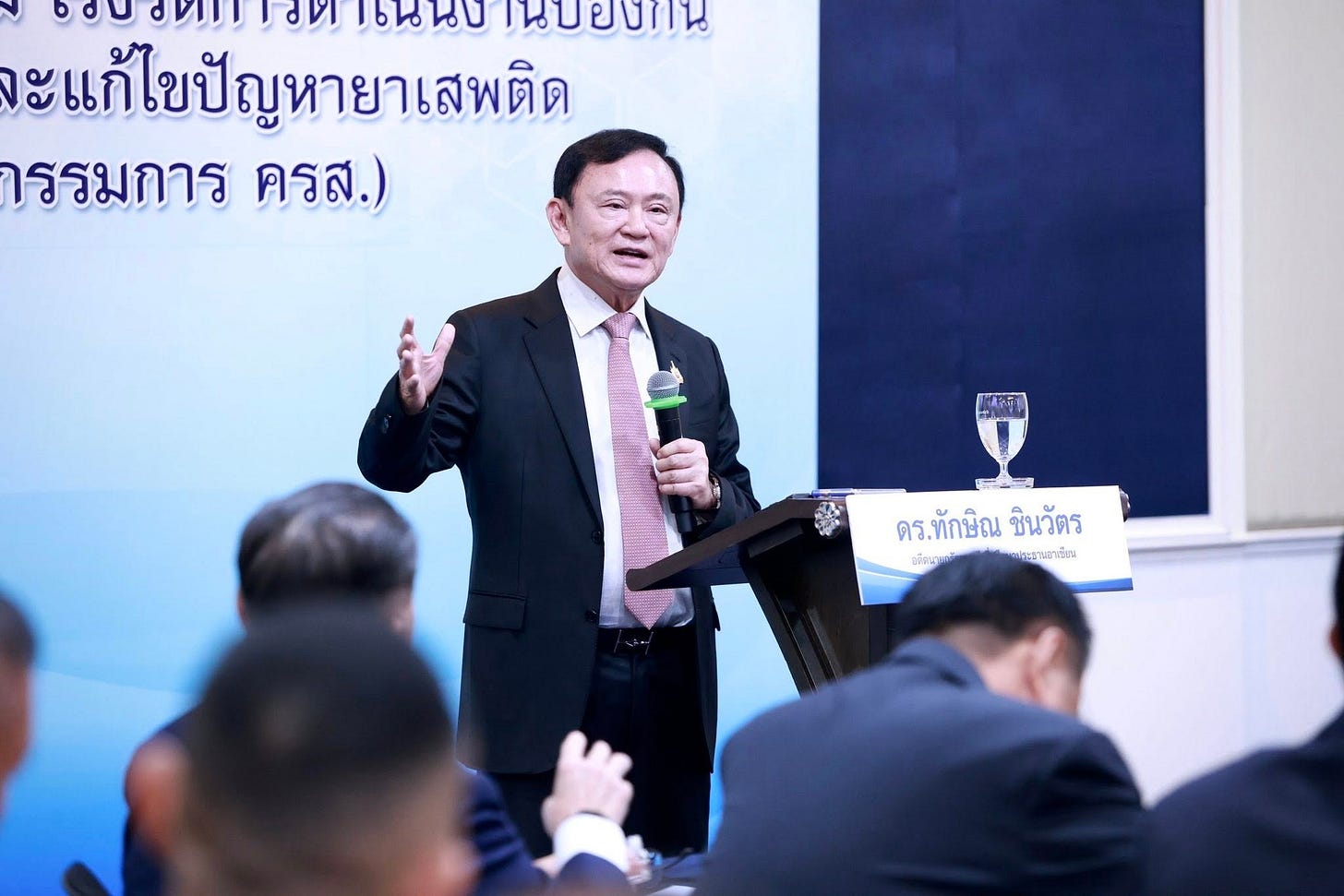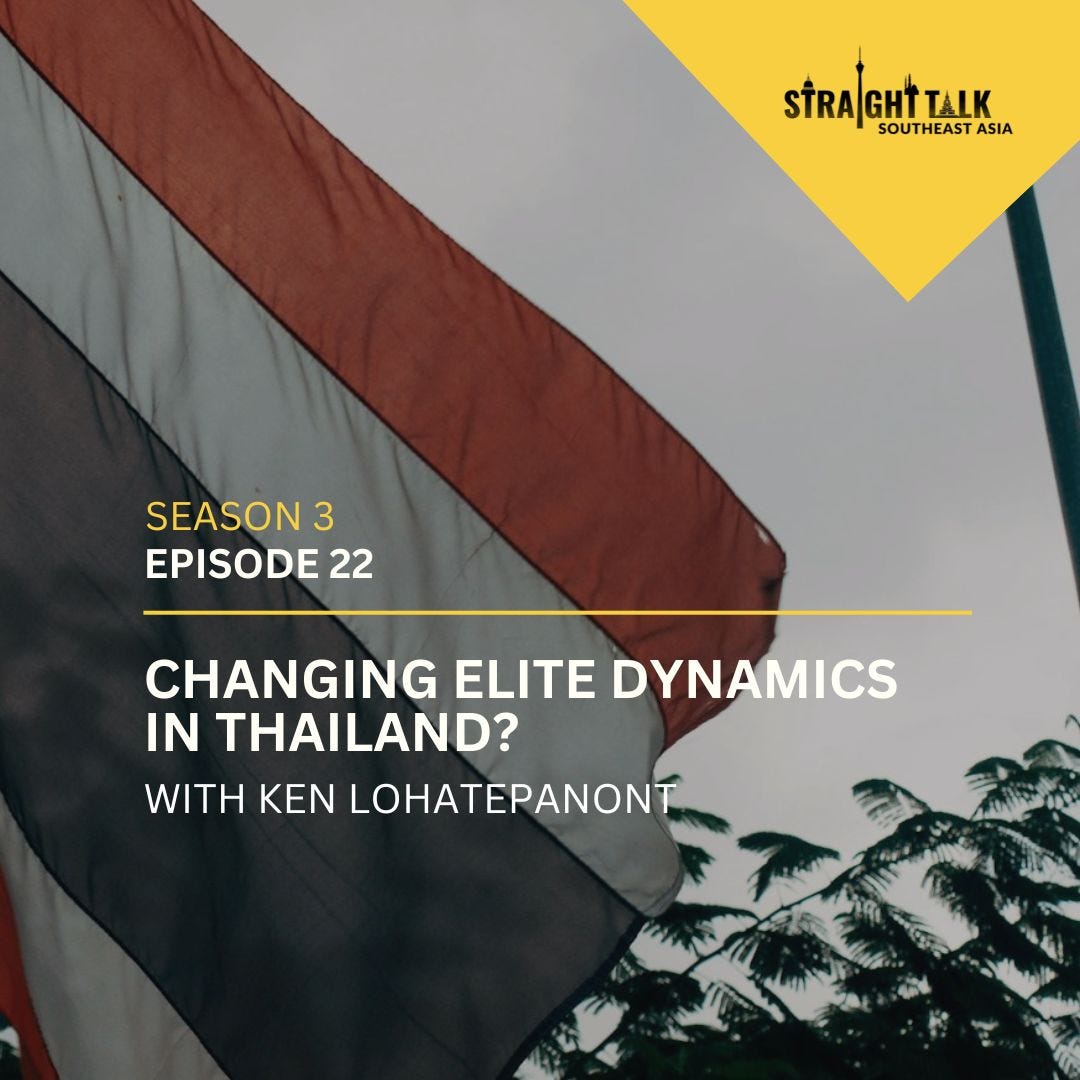"Sixty Days of Danger"
Another turbulent season for Thai politics?

I was recently on the Straight Talk Southeast Asia Podcast with Dr. Bridget Welsh to discuss changing elite dynamics in Thai politics. You can listen to the episode on Spotify or on Spreaker.
The monsoon season has been politically stormy in Thailand over the past two years. The middle of 2023 saw the psychodrama between Move Forward and Pheu Thai play out, culminating in the grand compromise that ejected the MFP out of the government. 2024’s rainy season was taken up by the dissolution of the MFP and the defenestration of former prime minister Srettha Thavisin. Will 2025 be any different?
Thai PBS recently ran a talk show featuring veteran journalist Suthichai Yoon with Pranot Vilapasuwan and Wisuth Komwatcharapong. The topic for the show? “Sixty days of danger.” The political temperature, Pranot noted, was “turning hotter than global warming.” They laid out the timeline of events to watch, spanning sixty days:
May 14: The Constitutional Court orders Justice Minister Tawee Sodsong to stop performing duties related to the Department of Special Investigation
May 19-21: Various senators affiliated with the “dark blue” faction and figures associated with Bhumjaithai are called in for questioning
May 22: The Supreme Administrative Court orders former prime minister Yingluck Shinawatra to repay damages totaling 10 billion baht stemming from her government’s rice pledging scheme
May 28-31: Parliament deliberates on the national budget for next year
May 30: Minister of Public Health Somsak Thepsuthin must decide whether or not to veto a resolution by the Medical Council punishing three doctors involved in Thaksin Shinawatra’s transfer to the Police General Hospital from prison. The Senate will also vote on various appointments to independent agencies and the Constitutional Court
June 13: The Supreme Court will hold hearings on Thaksin’s case.
July 2: Parliament may begin considering the Entertainment Complexes Bill.
What is the significance of these dates? I would break it down into three categories:
Some of these events are building up to a complete encirclement of the Shinawatra family. Thaksin had previously said that Yingluck, who has her own prison sentence and is still living in self-exile abroad, could return home in the foreseeable future, but never clarified what legal miracles would have to be performed for Yingluck to return with a minimal or no jail sentence like he did. The court decision to uphold the order for Yingluck to pay a massive sum of money shuts the door on a return for the time being. As Thaksin said on Tuesday on whether or not Yingluck can return: “Someone is blowing a storm. The storm will pass. I don’t know who is blowing the storm — they keep blowing — but it will end soon.”
Thaksin perhaps sounds a little impossibly optimistic, because the storm is also engulfing him. I wrote previously about the intensifying investigations on Thaksin’s stay on the 14th floor of the Police General Hospital. The worst case scenario for Thaksin is that he is ordered back to prison to serve out a genuine sentence. This, of course, is the fate that Thaksin has appeared to want to avoid all along, so much so that rumors began that he has already fled the country to avoid this eventuality. His public appearance yesterday helped to squash this rumor (he even commented that he was still “living well, not fleeing anywhere”). Yet there won’t be any way of completely killing off speculation that Thaksin will run once again to avoid being ordered back to jail. Prime Minister Paetongtarn Shinawatra was even forced to deny rumors that she had flown to the United Kingdom to explore a potential escape route for her father.1
This timeline also mixes in several dates that are shaping up to be a potentially mortal threat to the Bhumjaithai Party. The party is currently fighting allegations that it engaged in illegal collusion and vote-buying in last year’s Senate elections. The party has threatened to sue a reserve senator who made these accusations, and the senators have succeeded in getting Justice Minister Tawee Sodsong suspended from overseeing the DSI while it completes its investigation into this matter. But Bhumjaithai now has a dissolution case on its hands — it is possible that this issue works its way to the Constitutional Court. While this case is unresolved, it remains to be seen whether or not the “dark blue” faction of the Senate will be willing to wield their ordinary power. Already, the “new species” senators (aligned with the progressives) have already called on the Senate to delay consideration of major appointments within its power until the investigations conclude.
Finally, coming parliamentary action represents tests for coalition stability. I anticipate that the national budget will pass without much drama, given that key players like Bhumjaithai leader Anutin Charnvirakul has already promised to support the bill. (Analysts note that all of Bhumjaithai’s ministries are set to receive budget increases). It’s worth watching, however, how the casino bill fares.
There will be more to say about all of these developments in the coming weeks. For now, let me end with the most important question: how likely is a collapse in the Pheu Thai government in the next few months? I would rate the likelihood of an intentional collapse in the government as quite low — I doubt that anyone is quite ready for a general election yet — but I would not rule out major changes to the government’s makeup. Rumors continue of a “prime minister swap”, where Paetongtarn could be swapped out for Anutin (in exchange for Bhumjaithai forfeiting some major ministry), although Thaksin has ruled this out. The media continues to also discuss a potential cabinet reshuffle coming soon.
What I think is possible, however, is events developing to the point where a collapse in the government becomes impossible to avoid. It’s the butterfly effect: sometimes new developments just acquire a momentum of their own that becomes difficult to halt, whatever the original intentions. Both Thaksin’s potential return to prison and — to a slightly lesser extent — the potential dissolution of Bhumjaithai Party could be seen as the metaphorical turning over of the game board. If the grand compromise involves power sharing between Pheu Thai and the conservatives, coupled with Thaksin being able to stay in Thailand as a free man, then either scenario could represent a fatal breaching of this compromise. If the Medical Council insists on upholding its findings regarding Thaksin’s doctors, regardless of Somsak Thepsuthin’s veto, would the courts be able to dismiss it? And if they are not, is there a way to justify Thaksin staying out of prison? In that case, what would be the purpose of continued collaboration between Pheu Thai and the conservative parties?
The 2025 monsoon season could shape up to be very stormy indeed.
To be fair to the critics, Paetongtarn’s trip to the UK to “promote soft power” did rightfully raise questions about whether or not it was a good use of the prime minister’s time when she did not get to meet with Sir Keir Starmer.



Having lived in Thailand for close to 14 years, and before that having traveled here for both business and sailing regattas since the 1980s, I still find it close to impossibly hard to understand almost anything about the intricacies of Thai politics, the kingdom’s ever-changing constitution, and the roles (and integrity) of the various courts. Which is why I appreciate your analyses so much.
One question that has always intrigued me is why the various governments have achieved so little in the way of practical reform that would enrich and improve the day-to-day experience of the people who elect them. Obvious things such as a long term plan to make drinkable water available to the whole country outside of Bangkok. Or establishing road building standards that are enforced across the whole country to obviate the need to resurface them (equally badly) every few years. Or incentivising central government and provincial agencies to develop customer friendly technology that brings us into the 21st century. But the list is far, far longer and far more complex than this, of course.
I have long felt, and your post today would lend support to this, that the key issue here is that the system of government is pretty well dysfunctional leading to a situation where the PM, the cabinet ministers, the party leaders and the political power brokers must spend 90% of their time focussed on their near-term survival. Such survival issues as where will the next legal challenge to their own position or to their party’s existence come from? What can they trade with rivals to consolidate their power or to remove a new threat to it? What policy “news” can they release to the media today that might strengthen their reputation (despite nothing ever actually transpiring, and little follow-up from the press). And that’s not to even mention the time spent by many on enriching themselves and their fellow-travelers.
So, how do we achieve the fundamental reforms the people of Thailand (and the thousands of well run local companies) so richly deserve? Short of a truly benevolent dictatorship, or a governing party that prioritizes a workable, modern constitution and substantive progressive improvements to the country’s modus operandi — both of which continue to be exceptionally unlikely — I fear nothing will ever change. And Thailand will fall increasingly behind its peers economically.
I returned from 2 weeks in China at the weekend. China overtook Thailand in GDP per capita only 13 years ago, but today China’s GDP per capita is approaching double that of Thailand. Since 2006, Thailand’s GDP per capita has somewhat more than doubled, while Vietnam’s has gone up almost five times. Et alia.
It depresses the hell out of me. Thailand has so much more potential than any of its governments have properly exploited and built upon. But without fundamental change in its political and public systems, it will only continue to lag behind its peers.
Another excellent article, Ken. I can't see the elite letting the alliance between PT and Bhumjaithai collapse, however
Could it be Somsak will defy the Medical Council and reject their disciplinary findings regarding the three doctors?